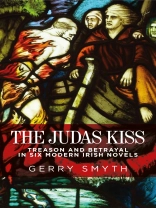This book argues that modern Irish history encompasses a deep-seated fear of betrayal, and that this fear has been especially prevalent since the revolutionary period at the outset of the twentieth century. The author goes on to argue that the novel is the literary form most apt for the exploration of betrayal in its social, political and psychological dimensions. The significance of this thesis comes into focus in terms of a number of recent developments – most notably, the economic downturn (and the political and civic betrayals implicated therein) and revelations of the Catholic Church’s failure in its pastoral mission. As many observers note, such developments have brought the language of betrayal to the forefront of contemporary Irish life. This book offers a powerful analysis of modern Irish history as regarded from the perspective of some its most incisive minds, including James Joyce, Liam O’Flaherty, Elizabeth Bowen, Francis Stuart, Eugene Mc Cabe and Anne Enright.
Inhoudsopgave
Introduction: Betrayal and the Irish Novel
Part I
1. A short history of betrayal
2. Déirdre and the Sons of Usnach: a case study in Irish betrayal
Part II
3. ‘Trust not appearances’ – James Joyce’s Ulysses (1922)
4. the landscape of betrayal – Liam O’Flaherty’s The Informer (1925)
5. a spy in the house of love– Elizabeth Bowen’s The Heat of the Day (1949)
6. Jesus or Judas? – Francis Stuart’s Black List, Section H (1971)
7. ‘Cangled both to treachery’ – Eugene Mc Cabe’s Death and Nightingales (1993)
8. ‘A family – a whole fucking country – drowning in shame’ – Anne Enright’s The Gathering (2007)
Index
Over de auteur
Gerry Smyth is a Reader in Cultural History at Liverpool John Moores University












